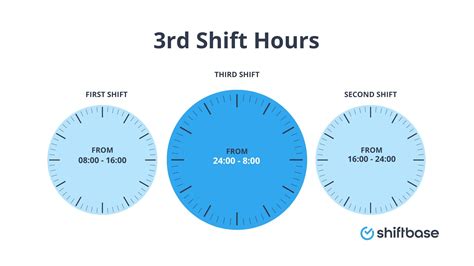Intro
Discover the ins and outs of third shift hours, including benefits, challenges, and tips for adjusting to a non-traditional work schedule. Learn about graveyard shifts, night shifts, and rotating shifts, and how to maintain a healthy work-life balance. Get expert advice on managing sleep, nutrition, and social life as a third shift worker.
Working non-traditional hours is becoming increasingly common in various industries, and one of the most notable examples is the third shift. Also known as the graveyard shift or night shift, third shift hours can be challenging for those who work them. In this article, we will delve into the details of third shift hours, including what they are, the benefits and drawbacks, and tips for adjusting to this unique work schedule.
What are Third Shift Hours?
Third shift hours typically refer to a work schedule that takes place during late night to early morning hours, usually between 10 PM and 6 AM. This shift is also known as the graveyard shift, night shift, or third watch. The exact hours may vary depending on the industry, company, or job requirements, but the general idea is that workers are on duty during the late night and early morning hours when most people are asleep.

Industries that Typically Work Third Shift Hours
Several industries require workers to work third shift hours, including:
- Healthcare: Nurses, doctors, and other medical professionals often work night shifts to care for patients.
- Manufacturing: Factory workers may work third shift hours to meet production demands.
- Transportation: Truck drivers, taxi drivers, and other transportation workers may work at night to transport goods or people.
- Customer Service: Some customer service representatives work night shifts to handle customer inquiries from different time zones.
- Security: Security guards and police officers often work third shift hours to maintain public safety.
Benefits of Working Third Shift Hours
While working third shift hours can be challenging, there are some benefits to this schedule:
- Increased Pay: Many companies offer higher pay rates for workers who work third shift hours.
- Less Traffic: Commuting to work during late night hours can be faster and more convenient.
- Quieter Work Environment: Depending on the industry, working at night can be less chaotic and quieter than working during the day.
- More Autonomy: Night shift workers may have more independence and autonomy in their work.
Drawbacks of Working Third Shift Hours
However, working third shift hours also has some significant drawbacks:
- Sleep Disturbances: Working at night can disrupt the body's natural sleep-wake cycle, leading to sleep disturbances and fatigue.
- Social Isolation: Working at night can make it difficult to maintain social relationships and participate in daytime activities.
- Health Risks: Long-term night shift work has been linked to various health risks, including obesity, diabetes, and cardiovascular disease.
- Family Challenges: Working third shift hours can be challenging for those with families, as it can disrupt family routines and relationships.
Tips for Adjusting to Third Shift Hours
If you're new to working third shift hours, here are some tips to help you adjust:
- Establish a Routine: Stick to a regular sleep schedule, even on days off, to help regulate your body's internal clock.
- Improve Sleep Environment: Make your sleep environment comfortable, dark, quiet, and cool to improve sleep quality.
- Stay Active: Regular exercise can help reduce fatigue and improve overall health.
- Eat a Balanced Diet: A healthy diet can help maintain energy levels and support overall health.
- Stay Connected: Make an effort to stay connected with family and friends, even if it's just a phone call or video chat.
Managing the Challenges of Third Shift Hours
While working third shift hours can be challenging, there are ways to manage the difficulties:
- Take Breaks: Take regular breaks to stretch, move around, and rest your eyes.
- Stay Hydrated: Drink plenty of water throughout your shift to stay alert and focused.
- Use Light Therapy: Exposure to bright light during night shifts can help regulate your circadian rhythms.
- Prioritize Self-Care: Make time for activities that promote relaxation and stress reduction, such as meditation or yoga.
Conclusion
Working third shift hours can be challenging, but with the right strategies and mindset, it's possible to adjust and thrive. By understanding the benefits and drawbacks of working third shift hours, you can make informed decisions about your career and lifestyle. Whether you're a seasoned night shift worker or just starting out, remember to prioritize your health, well-being, and relationships to make the most of your unique work schedule.
FAQs
What are the most common industries that work third shift hours?
+Healthcare, manufacturing, transportation, customer service, and security are some of the most common industries that work third shift hours.
How can I adjust to working third shift hours?
+Establish a routine, improve your sleep environment, stay active, eat a balanced diet, and stay connected with family and friends to help adjust to working third shift hours.
What are the health risks associated with working third shift hours?
+Long-term night shift work has been linked to various health risks, including obesity, diabetes, and cardiovascular disease.
